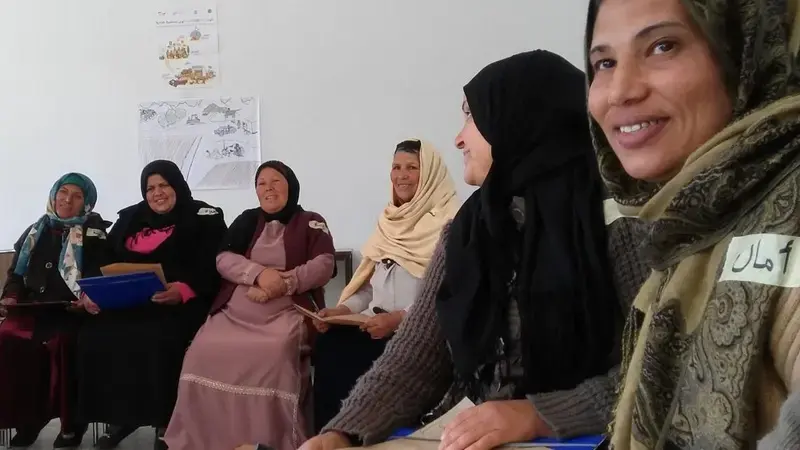Empowering female farmers in Tunisia

Tunisian women play a central role in the country’s livestock sector. They look after the animals kept on the farm and are involved in the processing, storage and sale of livestock products. In Tunisia, women's equality and protection is included in the country’s new constitution. However, inequities still persist: gender disparities in extension programs endure and women farmers continue to be marginalized, having limited access to new information, practices, and technologies.
This is a missed opportunity. Research is clear on the importance of gender-sensitive extension programs and their positive impacts on technology adoption. Recent studies in Africa show that participatory livestock extension programs targeting women increase productivity and enhance income-generating opportunities for rural households.
‘Mind the Gap’
The ICARDA-managed ‘Mind the Gap’ project, an initiative in Tunisia designed to develop and test new and existing models of technology transfer, is investigating the effectiveness of gender-focused extension strategies. The research is feeding into the project’s wider objective of addressing low technology adoption rates, which continue to hold back agricultural development and productivity.
The project focuses on livestock-barley production systems, strategically important in Tunisia and North Africa and a major source of income for the rural poor. It combines new technologies and innovations with different extension strategies to explore the most practical and cost-effective options for smallholder farmers.
Testing gender-sensitive extension strategies
In order to investigate the effectiveness of different extension approaches, ‘Mind the Gap’ is implementing a randomized controlled trial (RCT) approach by comparing randomly selected groups that receive (“treatment”) with those that do not receive (“control”) the extension approaches that are being tested. Different treatment groups receive different types of extension approaches. The groups are compared with each other and against the control group receiving no treatment. This means that a sample of 700 smallholder households is separated into groups, receiving different types of information, technology and training packages – helping researchers to compare efficiencies, cost-effectiveness, and impacts on technology adoption rates, farmer productivity, and household livelihoods.
A special group participates in training sessions on business and organizational development, and two additional groups are exposed to agricultural extension approaches adapted specifically for women.
These gender-sensitive trainings enhance women’s business skills so they can more effectively solve problems and become successful entrepreneurs. A total of 14 interventions are planned for 2017 (with the first sessions already initiated, in February 2017). By the end of the year 280 women will have received training. Each session is led by a trainer specialized in teaching illiterate women without previous training experience, using state-of-the art visualization schemes.
A baseline and follow-up survey before and after the training, will measure the success, best practices and lessons learned. Informal interactions with the women reveal that many are already very positive about the ongoing training sessions, are discovering the power of combining individual strengths with new skills, and looking forward to the opportunity of shaping their own business models. The initiative is perceived as an eye-opener “We can see our farms in a new light”, a participant said.
Author: Dr. Jutta Werner, an ICARDA Rural Development Scientist
Acknowledgements
This project is conducted under the framework of ICARDA and financially supported by the German Federal Ministry for Economic Cooperation and Development (BMZ).
